Dr. Bhamarjun Acharya is a noted constitutional scholar of Nepal. He has been doing research on the constitutional development of Nepal besides practicing at the country’s Supreme Court. He has written a number of books and essays on legal issues. Khabarhub caught up with Dr. Acharya. Some excerpts:
How do you assess the implementation aspect of Nepal’s new constitution promulgated in 2015?
The current constitution is the seventh experience in Nepal’s constitutional history. When we talk about the international practice of writing a constitution, there are mainly two procedures: a constitution is either written by a team of experts or it is written by the representatives of people that is through a constituent assembly. First time in Nepal, the latter has been experimented.
The current constitution can be assessed on various grounds such as the cost involved in its promulgation, whether or not the promises made by it have been achieved, the contents covered by it, and its performance.
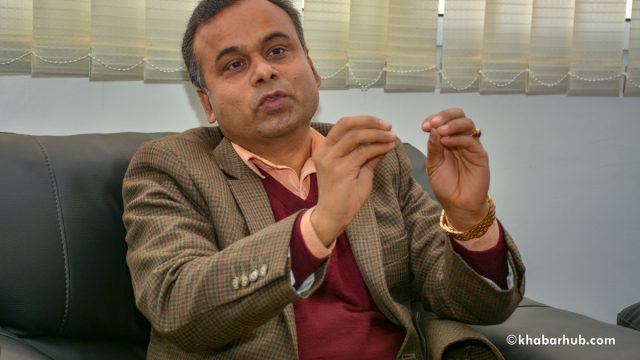
Interestingly, this is probably the most expensive constitution as of yet that incurred around 600 billion during its writing process. The question is whether its output is in proportion to the cost involved in its promulgation.
The biggest weakness of the current constitution lies in its failure to delivery. Unfortunately, it has utterly failed to deliver promises made to the people.
Do you think that the country’s constitution has reflected the spirit and aspiration of the people?
In fact, yes. A constitution should reflect the spirit and aspirations of the people. Even though this constitution has several good aspects, it has failed to incorporate certain demands of the people. For example, secularism and federalism were not people’s issues.
Concerning its efficiency, completion of election process at three levels and enactment of many laws as demanded by the constitution are some positive aspects. However, it has lagged behind in terms of meeting people’s aspiration and the promises mentioned in its preamble.
What are your predictions for the future given the present scenario involving the constitution and the country?
A constitution is not written just for the present generation. It is meant for many generations to come. However, given the dismal output of the constitution at present, I see its future challenging.
The constitution has the provision of constitutional bodies besides government bodies. How do you find their roles and performances?
A state with a functioning democracy has important social, legal and political institutions. A constitution has the provision of constitution bodies whose function is to make the government accountable to the people. However, if we look at judiciary, it is not devoid of controversy. The Commission for the Investigation of Abuse of Authority (CIAA) also got embroiled in controversy. The performance of other constitutional bodies is also not satisfactory.
On the political front, people are dissatisfied with the government. Presence of the opposition is not felt. As for the civil institution, there are some media that are acting responsibly.
People’s wish and aspirations are no more compatible with the government’s activities. There is a high level of frustration among public.
The biggest weakness of the current constitution lies in its failure to delivery. Unfortunately, it has utterly failed to deliver promises made to the people.
The current majority government came to the power with the slogan of nationalism. Given the government’s activities, how do you see the future of the system the country has adopted?
Democracy undoubtedly has its future. But there definitely lies a serious question on the fate of the government. It would be a failure to test people’s patience. People waited patiently for the promulgation of the new constitution for more than eight years.
The government then said that it needed time to hold elections as demanded by the new constitution. That got completed. The government told people that it needed some time to formulate laws as per the spirit of the constitution to grant rights to the people. And that has been completed as well.
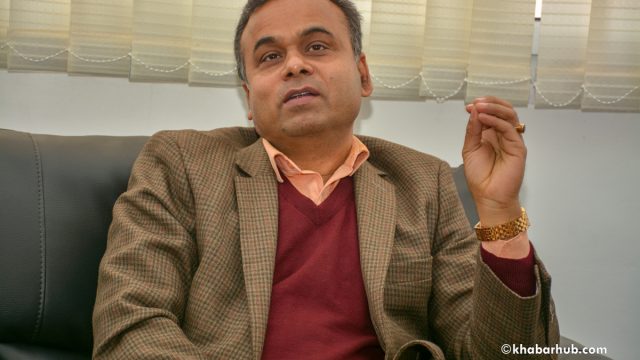
Now there are no excuses from the government. Their only expectation is the delivery on part of the government. If you look at the delivery aspect that is almost nil. The inflation rate is high, the nation is submerged in debt. If this situation persist, people will go against the current mode of governance. People’s wish and aspirations are no more compatible with the government’s activities. There is a high level of frustration among public.
What would be the best way out?
The government and its officials should be honest and accountable towards the people and the constitution. The government should translate its promises made to the people and also the promises made by the constitution into reality. You should also think of reforming the structure that the constitution cannot uphold. My indication is on the federal set up.
What do you mean by reforms in the federal structure?
The past three years have shown that we do not need the provincial governments when every administrative act is performed by the local bodies. As for addressing the issue of ethnic minority, naming a province after an ethnic community is not a solution. However, we should not hesitate in granting them with rights and privileges.
Malaysia, one of the favored destinations for Nepali youth migrants, has stopped hiring Nepali workers for the past nine months consequently depriving several youths of employment opportunities. Ramesh Bharati of Khabarhub caught up with Uday Raj Pandey, the newly appointed Nepali Ambassador for Malaysia and talked about his plans. Excerpts:
What are your plans upon assuming the office in Malaysia?
The climate of Malaysia is similar to that of Nepal. That is why it remains as one of the most favorite destination countries for Nepali migrant workers. I will work with a new plan and vision in Malaysia in the days to come. Nepali Embassy in Malaysia will firstly identify the workers’ problems and then endeavor to resolve them. Similarly, my team will also look for new avenues of trade and employment in the country.
It has often come to the fore through media that the situation of workers in Malaysia is deplorable and that they are duped by their agents. How would you deal with these problems?
Many Nepalis are doing well in Malaysia. However, some workers employed in small and middle-scale industries are in trouble. Nepali Embassy has taken this issue seriously. Currently, there are around 500,000 Nepalis working in Malaysia. As per the estimates of Nepal government, around 1 00,000 Nepalis are working there illegally due to non-renewal of their documents. The embassy will work in helping those workers return home safely.
The agents duping Nepalese workers are under close scrutiny of the embassy. Action will be taken against them.
Malaysia has stopped hiring Nepali migrants for the past nine months. What will be your role in resuming the hiring process?
Malaysia stopped hiring Nepali workers since the government on May 16, 2018, scrapped various institutions in Nepal that had been exploiting Malaysia bound Nepali workers under the pretext of their medical examination. The Nepali Embassy in Malaysia is carrying out necessary homework for discussions with the Malaysian counterpart to resume the labor hiring process.
The problem is not only with the Nepali migrant youths. Malaysia has also stopped the hiring process from other countries at the moment since it is working towards formulating laws regarding foreign employment.
Very soon Malaysia will open its border for foreign workers, and Nepali workers will be in its priority list. We are holding talks with the Malaysian government. Malaysia favors Nepali workers.
Several Nepali youths are languishing in Malaysian jails. What steps will the embassy take for their release?
Nepali Embassy is collecting data on the number of Nepali workers in Malaysian jails. As per the record of the embassy, there are a total of 206 Nepalis in Malaysian jails. I shall lobby for their release. Similarly, there are 106 Nepali workers at the embassy’s shelter. We will expedite the process for their safe return home.
How do you find the prospects of trade and commerce between Nepal and Malaysia?
The Malaysian government is interested to make investments in Nepal in the sectors such as agriculture, tourism, technology, and industries. Nepali Embassy will facilitate and encourage Malaysian investment in Nepal. Similarly, it will work towards the export of agricultural and industrial products from Nepal to Malaysia.
The United Arab Emirates (UAE) has been one of the favored destinations for Nepali migrant workers. Newly appointed ambassador for UAE, Krishna Prasad Dhakal has expressed his commitment to work for the rights of Nepali workers in the UAE. Ramesh Bharati at Khabarhub caught up with Ambassador Dhakal. Excerpts:
What will be your first mission upon assuming the office in the UAE?
I am familiar with the problems faced by Nepali migrants in the UAE to some extent. My first initiation would be to analyze the problems faced by Nepali youths there and then try to solve their problems. I shall also hold discussions with the workers and their employees in order to identify the problems and find out the solution measures.
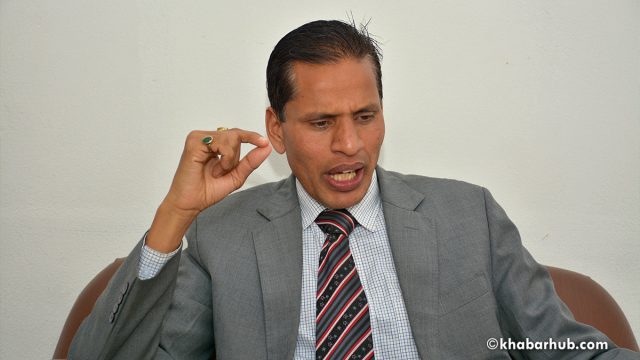
What is your understanding about the situation of Nepali migrant workers there?
So far as my knowledge is concerned, the situation of Nepali migrants in the UAE is good compared to other destination countries. Even the UAE government treats them well and the youths are earning well. There is no authentic data but I have heard that around 300,000 Nepali youths are working in the UAE. Those who have been working illegally are in trouble.
Do you have any plans to make a new agreement with the UAE?
Nepal government had reached an agreement with the UAE government in 2007 in regards to supplying Nepali workers. Since then there have been no bilateral agreements so far. Just like in the case of Middle East countries and Malaysia, Nepali embassy will initiate dialogue with the UAE government on the provision of free visa and air tickets to Nepali migrants bound for UAE.
There are complaints that diplomatic missions abroad do not heed to the complaints of migrant workers. How would you address their concerns?
Forget the past. During my tenure, Nepali workers in the UAE will get full support from the embassy. Nepali Embassy will have its presence at the companies that employ Nepali workers. Any problems faced by the workers will be sorted out as per the ILO legal procedure, in coordination with the UAE government.
Several migrant workers are behind bars there. How do they end up in jails?
I need to explore this issue further. Yes, I have heard that some Nepalis end up in jail because of their failure to renew the visa. I have also heard that some Nepalis create problems at public places by consuming liquor. Foreign Employment Promotion Board is providing legal counseling to Nepali workers in jails since last year. My first task in the UAE would be to get the Nepalis out of jails through diplomatic lobbying.
Are there any prospects of bilateral trade relations?
I can see many areas on which Nepal can work in tandem with the UAE. Nepal can have a high volume trade with it. Its current trade with UAE exceeds 29 billion per year. Nepal has been exporting goods worth 100 million per year to the UAE. Attempts to increase exports will be made.
UAE government has shown the interest to import water from Nepal. At present, the UAE has been importing agricultural goods from Canada and some African countries. Nepal can also supply agro goods to the UAE. The two countries can cooperate in other areas as well.
The ruling Nepal Communist Party (NCP) dissolved the task force formed to finalize the party’s unification process. There are voices of disgruntlement with the government’s performance within the party itself. Jibaram Bhandari and Ishwar Khanal of Khabarhub caught up with Narayan Kaji Shrestha, spokesperson of the ruling NCP at the office of Khabarhub at Durbar Marg to get an overall view of the party and the government. Excerpts:
The task force formed to finalize the party’s unification process has been dissolved. There are disgruntled voices within the party. What’s the real scenario?
It is evident that the task force entrusted to finalize the structural unification of the party took a long time. Moreover, the party itself is entangled with several problems. However, the need of the hour is to finalize the task at any cost. There will be no looking behind. The party secretariat will now work on it taking it to a logical end.
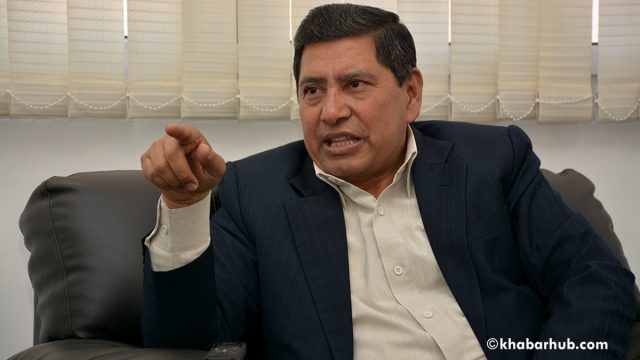
Is it a failure on the part of the leadership?
In fact, the task force was entrusted with the task of finalizing the structural unification within three months. However, it failed to do so in nine months. This has given a negative message to the general people. There are lapses for sure.
You said there are problems within the party. What is the way out?
The issue was raised seriously in Friday’s meeting of the party secretariat. As a way out, the chairmen duo now need to prepare a report on the organizational structure and present it to the secretariat within a week. This is what has been discussed.
The government has completed its first year in office. What is your analysis?
People had high expectations from the government. Undeniably, it failed to meet the people’s expectations in the last one year regardless of its efforts. It is high time the government reviewed its functioning and move ahead accordingly. Firstly, the government should prioritize anti-corruption campaign and good governance without which the dream of prosperity cannot be achieved. Moreover, it should also emphasize on development activities to give a direct feel of prosperity to the people. My concern is people should feel and see the change. It is, however, too early to be critical since the government has four more years to prove itself.
Is the party thinking about cabinet reshuffle?
I am not quite sure about it since the issue has not been discussed in the party as of now. Frankly speaking, I am not informed if the prime minister has discussed the issue with other leaders.
The government has been engaged in futile and trivial issues such as the Venezuela issue rather than prioritizing on major programs? What is your observation?
Let me be very clear that foreign intervention will not be acceptable at any cost. This will only lead to complications and unfortunate circumstances. I believe that unnecessary foreign meddling will directly affect the Nepali people. In fact, what we believe is that no country should intervene in a sovereign country’s internal affairs. We want to have a smooth relation with all our friendly countries, including the United States. Let’s not blow up the issue. The government is serious in maintaining law and order.
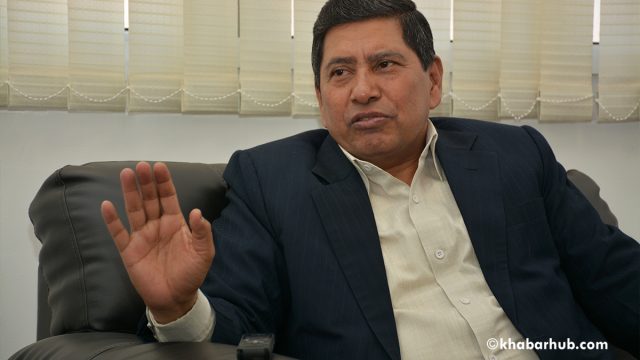
The government and the parliament have failed to perform effectively to address people’s aspirations. Why?
The government got occupied in formulating the laws and implementing the federal set up, which is something totally new to the country. It also focused on introducing the social security fund, among other ambitious programs. These are some positive aspects. However, the government has failed to control corruption in the country. Moreover, we need to change our mindset of running the country by remittance and customs revenue.
There have been several instances that the government has receded from its agreements made with different sectors. Why?
The government should not shy away from the agreements made with political parties and other sectors. Such an intention will defame politics. Implementation of agreements is vital.
Citizen Bill has been tabled at the parliament amid disgruntled voices that the Bill would be a threat to Nepal’s sovereignty. What will be the repercussion if the parliament endorsed the Bill?
In fact, the issue has been discussed seriously in the party secretariat. The party will soon hold dialogue with all political forces, members of the civil society and other stakeholders and will come up with a solution through consensus. We are serious about it.
The government today presented a bill on Information Technology. Is it going to impose restriction on social media?
Social media should not be controlled. It has to be monitored. It would be a grave mistake if the government tried to control social media. The government might have taken the step to simply monitor social media.
Bishwa Bandhu Thapa, 92, perhaps one of the last remaining survivors of the 1951 revolution, is a witness to Nepal’s several political upheavals and changes.
He witnessed Rana’s feudal regime, absolute monarchy, constitutional monarchy, and now federal republicanism within a span of few years.
Still peppy, a nonagenarian Thapa reminisces those ‘difficult, yet strenuous’ days when BP Koirala and Subarna Shumsher and Thapa came together to fight for a cause – to establish democracy.
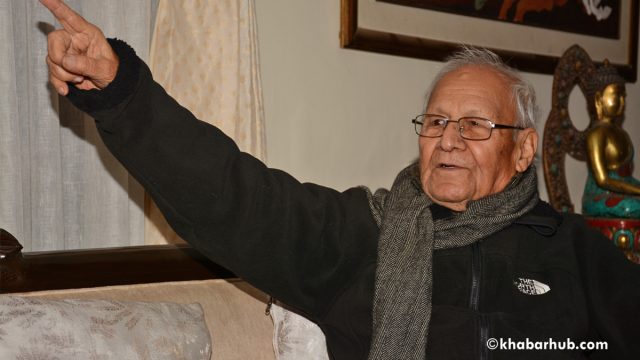
“And you know what?” he goes on to say: “The political changes in Nepal would not succeed without India’s support.” Here, he tried to ascertain that every political movement in Nepal has India’s support in one way or the other.
History cannot forget Thapa’s key role supporting King Mahendra in staging a ‘coup’ in 1961 by ousting BP Koirala, the then elected and powerful prime minister. Thapa, however, defends his move saying, “My intent then was to see stability and development in the country.”
He is ‘well-informed’ about how political changes have happened in Nepal. “I have seen all the changes – from the downfall of the Ranas in 1951, the restoration of democracy in 1990, and the establishment of Republican set up in Nepal,” quips Thapa confidence and pride.
“And you know what?” he goes on to say: “The political changes in Nepal would not succeed without India’s support.” Here, he tried to ascertain that every political movement in Nepal has India’s support in one way or the other.
Adds Thapa, “The formula is to appease our southern neighbor or else the government will collapse.”
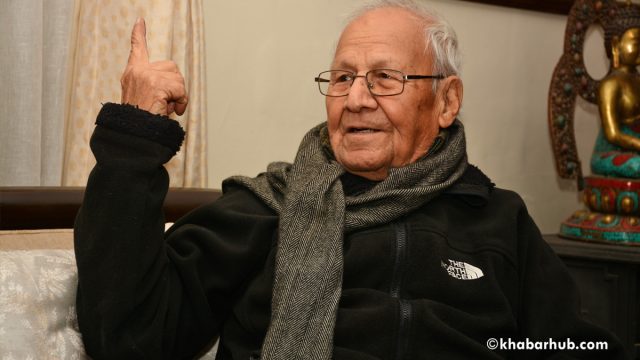
While saying so, Thapa reminisces his meeting with Chinese leader Mao Zedong some 50 years ago when the Chinese leader had ‘suggested’ him to “have good ties with India” rather than China for Nepal’s betterment.
When the country is observing the 69th Democracy Day, this nonagenarian leader, who fought for democracy, now is seriously disappointed at Nepal’s current situation.
He says the political leaders have failed to fulfill the aspirations of the people who fought for democracy and republicanism for years. “Look at Malaysia, Singapore, Thailand and look at us,” he says in a disenchanted voice while expressing his annoyance over the leaders’ approach and the style of working.
“Why should I hesitate to say that majority of the leaders are corrupt?” he queried with a sense of arrogance while justifying his claim that Nepal is far behind due to the failure to control corruption.
Recalling those old days, he says, “Bribery was a rare happening. It has become a fashion now.” Thapa adds, “A cup of tea or a cigarette would work as a bribe then because there was a fear of being punished. Minister and government officials were alert.”
However, he is shocked with the way political leaders, who had sacrificed everything for the sake of democracy, are now shamelessly indulged in corruption.
Economist and former Member of the National Planning Commission, and former Chief Economic Adviser to the Ministry of Finance, Dr. Govind Nepal suggests the government set up a time-bound target for implementing the development programs, which he claims will yield results thereby cheering the long disenchanted public. Khabarhub caught up Prof. Nepal on the government’s completion of one year in office to talk about its performance. Excerpts:
How do you assess the government’s one-year term?
After a long saga of political upheavals, the country got a stable government with a two-thirds majority. People’s expectations were high. Meaning, they were riding on high aspirations, and to experience the country’s overall transformation. But that is something unattainable in just a period of one year. Besides, the government had a Herculean task of executing federalism in the country, and it did succeed on that front by bringing out a number of Acts and managing financing for federalism.
It also dispelled the concern that setting up of the federal structure is impossible given the high cost. The country did not encounter a financial crisis in terms of structuring the central, federal and local governments. Around 50 percent of the revenue was collected in just six months that kept the country’s economy going.
The county also inked treaties with neighbors that are likely to render long-term benefits. Thus, its performance over a period is, in fact, satisfactory.
Is there anything the government missed or it could have done better?
Of course, there are ample of lacunas. Capital expenditure is low, the trade deficit is alarming. The balance of payment is unfavorable. The government needs to be more serious about these economic issues.
What measures should be adopted to increase export and reduce imports?
We cannot forget the fact that Nepal is still an agricultural country. Therefore, we need to focus on high-value crops that are only grown in Nepal. Prime Minister Agriculture Modernization Program should be accelerated.
The government also needs to facilitate the farmers and industrialists by dismantling trade barriers. We have regional organizations like SAARC, BBIN, and BIMSTEC. Nepal is a member to several international organizations as well. The government should exercise to utilize these forums for easy flow of Nepalese goods in the international market. Problems incurred during quarantine tests should be eased. Better trade facilitation is important.
Entrepreneurs should be provided with easy loans on a low-interest rate.
We need to enact laws so that technology transfer takes place easily thereby attracting foreign investment. The government seems committed towards this end but it is taking time to enact the laws.
Communists are assumed to be suspicious of multinational companies? Do you think the communist government will act in their favor?
Let’s look at China. It could make an economic leap thanks to foreign investment. This communist government believes in democracy, judiciary, and election. Practically, you do not find much difference between the Nepali Congress and the communist parties of Nepal. Therefore, the fear is unfounded.
Who is to be blamed for the country’s underdevelopment?
If you look at the history of developed nations today, they went through crises. Some were colonized and some faced terrible natural calamities. Nepal did not have to go through such pains.
It has relied on foreign aid for a long time. We prioritized politics rather than development since 2007. People were politicized rather than becoming professionals. We failed to welcome foreign investment and remained suspicious of foreign investment. Our thoughts and acts need to change. Our narrow thoughts of closed economy held us back. We need to benefit from new technology by mobilizing the youths.
We are also victimized by over consumerism in lack of effective government policy. For example, why do we need to import vehicles in such a huge number? Look at the number of motorcycles in Kathmandu. And think of the fuel consumed. If we had a good public transportation system, we would not be spending a huge amount on imports of vehicles.
What could be the way forward?
The government should make a plan for the next four years. The plans should be practical that can be incorporated in the yearly budget.
Development challenges have been identified. Setting up a time-bound target will help in moving ahead. This will yield results thereby cheering the long disenchanted public.
Planning alone is not enough. Implementation mechanism should also be well defined. The government should go hand in hand with other political parties. Confrontation with political parties will drain away its energy.
A good orator, Gagan Thapa represents the Nepali Congress party in the parliament. Widely popular for his charismatic attitude, youth leader Thapa talks about his party’s leadership and the intra-party wrangling during an exclusive conversation with Kabarhub. He is currently involved in ‘cleansing’ what he says party’s ‘filth’ to take the party to a newer height. Excerpts:
The decision of the party leadership should not be self-centric. It should be made in line with the party statute.
Nepali Congress seems to be weaker internally. The party is gripped with intra-party wrangling. It has not been able to address the internal issues. What is your reading?
Candidly speaking, intra-party feud is not new within the Nepali Congress. We, in fact, have been endeavoring to get into the root-cause of the problems. Take for an instance, we have not been able to sort out the issue of Nepal Students’ Union. Formation of an ad-hoc committee is not the way out. Therefore, the best option is to get into the root cause of the problems existing within the party.
NC President made an effort to alter the decision endorsed by the Mahasamiti meeting. Isn’t this a breach of the party statute?
Nepali Congress has its own statute. What I believe is that all party activities should be governed in line with the statute. Problems can be resolved if the statute is followed in letter and spirit. However, the top-rung leaders have been found to be ignoring the fact by making decisions arbitrarily to suit their interests. The decision of the party leadership should not be self-centric. It should be made in line with the party statute.
The views and opinions generated through by these factions should be channelized properly in the interest of the party while taking the party statute into consideration. The groups are formed based on some certain ideologies.
Do you mean to say that the party leadership is breaching the party statute?
Let me tell you frankly that we all are responsible for the weaknesses. We are imprisoned by our own habits and traits that we are not willing to shake off. We have to change our attitude.
Observers note that NC is mired in factions with leaders forming factions and sub-groups that led to the party’s downfall. What do you say?
Let me reiterate that the problems, which come to the surface quite often, will be resolved if the party leadership followed the party statute. There could be factions or groups within the party but the party should not be taken hostage in the name of factionalism.
My concern is that the leadership should try to find out the reasons behind the formation of factions within the party. The views and opinions generated by these factions should be channelized properly in the interest of the party while taking the party statute into consideration. The groups are formed based on some certain ideologies.
There were reports about the formation of a youth group to take the reins of the party. How is the preparation?
It is not important who leads the party. The question is whether the leadership will take the party to a newer height. The question is whether NC will emerge victorious in the next elections. Likewise, the concern is whether the party will steer the country to the path of development and prosperity to meet people’s expectations.
Handing over the leadership to the younger generation is just a part of the issue. Even if the rein of the party are handed over to the young generation, I think, it will not bring about any miracle overnight unless we have a pragmatic vision. Therefore, the need of the hour is to have a leadership with a vision and positive attitude.
Does the alliance of youth leaders still exist?
We are still active. We wanted our views to be heard in the central committee, which, unfortunately did not go well as expected. We, however, succeeded to discuss it at the Mahasamiti meeting. We are preparing to take the agenda to the grass-roots level. We are working on both the ideological as well and behavioral aspect so as to consolidate the party. We are also soon launching a nation-wide discourse on how the moral etiquette could be fostered and instilled in every party member in the NC.
We should move ahead with a ‘scientific mechanism’ on what needs to be done in the next five years after emerging victorious in the next federal elections. NC should be able to tell the voters what we will do in the next 50 years. The party should be able to tell the people what it can do in the future, not what it did in the past.
Nepali Congress leader and a candid orator, Amresh Kumar Singh talks about intra-party wrangling while emphasizing on holding party’s general convention to elect new visionary leadership. Khabarhub caught up with Singh, who is also a parliamentarian, and talked about contemporary issues. Excerpts:
Nepali Congress is currently entangled in internal wrangling. What do you think is the best way out to end this bickering?
I believe that holding the party’s general convention within the stipulated time is the only way out to resolve the ongoing intra-party squabbling. I have been reiterating that the party’s convention should not be extended on any pretext except under unavoidable circumstances. There are possibilities the party leadership could bring a justification to extend it to their benefits. The problem is compounded by the fact that the party leadership is unable to constitute the party departments as of yet.
What is your speculation about the new party leadership? What will be your role?
It is high time that the leadership handed over the party’s reins to the younger generation. I am against the idea of a leader – over 70 years of age — taking the reins of the party. Unfortunately, the party has not seen a charismatic and competent leader in the last several years. My role would be to lobby for the right, capable and a sincere leader, who can run the party by encompassing all factions together. The party has become defunct on all fronts due to the lack of visionary leadership, and you can see the consequences now. Moreover, leaders lack self-realization. Senior party leaders are gearing more towards becoming junior kings.
Does this mean that second-rung leaders are disappointed? Have you thought about taking charge of the party leadership?
In fact, there are instances which have disheartened the leaders. As I said, the leadership should be able to move ahead by taking into confidence all party leaders. About my leadership, time will tell (laughs). We all need to wait for the right time.
Nepali Congress has failed to prove itself as a strong opposition. Reason?
As I said earlier, NC is entangled in intra-party disputes. True, we have, failed to raise voices strongly in the parliament on contemporary issues. I would say that NC is still a strong party full of dynamism. Unfortunately, the incompetence on the part of the leadership has weakened the party. The party’s general convention will elect a new leadership, who is visionary and capable, and who will be able to take the party to a new height. Since people are gradually getting frustrated with the Nepal Communist Party (NCP), there is a chance for NC to win their hearts. Unfortunately, our party has not been able to attract people due to the lack of visionary leadership.
Aren’t you responsible for the party’s debilities?
Let me clarify. Our party is based on a presidential system, and other leaders do not have much say. Moreover, NC is not only the party that has lost is credibility, but even the ruling NCP leadership has also been losing its grip within the party. Moreover, the NCP has not been able to control corruption.
You talked about corruption. What is your take on the wide-body issue? Who do you think is responsible for this?
In fact, the government should take the moral responsibility for the rampant corruption – be it the wide-body issue of other cases such as Nepal Oil Corporation land deal, or the infamous 33-kilogram gold case. NC, as the main opposition in the parliament, should have protested intensely against corruption. But until and unless the government is accountable, the opposition is helpless. Moreover, the government has failed in all aspects, including maintaining law and order situation and delivering good governance. It is also involved in corruption.
Don’t you think that the previous NC-led government is equally responsible for the current state of affairs?
To be precise, we all have to understand that former Prime Minister Sher Bahadur Deuba led a coalition government. Therefore, it could not deliver much. Moreover, the government was fully occupied with conducting the much-awaited elections in the country. Therefore, in my opinion, this government with a two-third majority is more responsible for the deteriorating situation. See, all indices of the country are negative and every sector is almost defunct. The country has become a playground for foreigners due to the weak foreign policy. In fact, I would say, the Office of the Prime Minister is defunct.
Venezuela crisis has triggered waves on political spectrum of Nepal after Nepal Communist Party (NCP) Chairman Pushpa Kamal Dahal issued a statement accusing the US of intervening in the internal affairs of Venezuela. Prime Minister KP Oli has dubbed Dahal’s statement as a ‘slip of tongue’ in a bid to patch up Nepal-America ties upon his return from Davo Summit. Oli-Dahal relations soured after Dahal reiterated his stance terming his statement as official justifying that it was endorsed by the party’s secretariat.
Kashyap Neupane of Khabarhub talked to Arun Kumar Subedi, a political analyst and international relations expert, for his views on Venezuela crisis. Excerpts:
How do you analyze the differing views coming from the Nepal Communist Party and the government on the Venezuelan crisis?
This, in fact, can be analyzed from two dimensions. Marxists are too formal whom I prefer to call ‘doctrinal hypocrites.’ This issue is just a pretext to impress the general people. The communists, who earlier used to allege the US of being an imperialist, want to give the impression that they are still adamant to their stance.
It was a mistake on part of Nepal to assert its stance on the Venezuela crisis when there was no pressure to do so. We should not forget who we are.
What suggestions do you want to give to the government to patch up the souring relations between America and Nepal following the Venezuelan crisis?
In regards to diplomatic issues one should not be carried away by emotional attachment to a doctrine. We should be cautious on what harm or benefit our statements may cause to the country while commenting over a diplomatic issue. We were not under any pressure to express our views on contemporary political scenario in Venezuela. Had we refrained from making comments on the issue, it would have been more judicious.
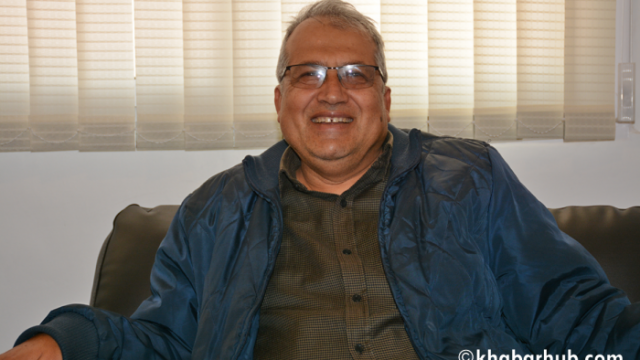
The more European Union and USA play in Nepal, China will become more provocative. We cannot overlook it. If we are able to maintain a balanced relation between China and India keeping Western power at a distance, there will be lesser problems. It was a mistake on part of Nepal to assert its stance on the Venezuela crisis when there was no pressure to do so. We should not forget who we are.
What could be the solution to the existing problem? The fear and uncertainty loom large after the relations between Nepal and America got soured.
We should try to defuse the tension between Nepal and America through diplomatic ways. The government tried to use ‘vocal diplomacy’ in its attempt to defuse the tension. Now the government should adopt ‘quiet diplomacy’ to resolve it.
What could be the consequences if Nepal, as presumed by the Western power, is inching toward China?
First of all, we should abandon the non-alignment foreign policy. That is why we should not take action under any ideological influence. Israel, Japan, South Korea, Singapore have not adopted non-alignment foreign policy. The problem will continue unless we change our foreign policy.
Do you mean that Nepal should change its foreign policy? What problem do you see with the non-alignment foreign policy?
We should maintain cool and calm demeanor, bearing in mind the benefits of the country in every diplomatic step we take. We should maintain only formal ties with western power, while giving priority to our close neighbors, India and China.
Normally, all political parties stand united when it comes to foreign policy. The case, however, is different in Nepal. What is your take on this?
Even though the party is one, the leaders hold divergent views. All political parties in Nepal represent one or the other international power. Nepal does not have enough internal resources to run costly political activities. They show concerns about us when we depend on them for resources used for running our politics. That is why our Nepali leadership is also mobilized by foreign powers.
Dr Rajiv Kumar Jha, who originally hails from Dhanusha district, is the director of Nepal Friendship Medical Research Center. Dr Jha has been taking a close look at the Nepal-China relations for the past 20 years. Khabarhub recently talked to Jha on the Nepal-China partnership, Belt and Road Initiative (BRI), and the development issue of Nepal while maintaining balance with India. Excerpts of the interview:
Khabarhub: Speculations are rife about a high-level visit from China this year. When do you think it will take place?
Dr Jha: China will send a high-level delegation to Nepal this year. Most probably, Chinese President Xi Jinping will embark on an official visit to Nepal in the middle of this year. Nepal has to start making necessary preparations to reap benefits from the historic visit.
Nepal’s state actors should be able to take China into confidence and benefit from BRI while maintaining balance with the southern neighbor at the same time. Connectivity is essential for Nepal’s development.
Khabarhub: China has made significant progress in the field of commerce and trade, of late. But Nepal is still lagging far behind. What suggestions do you have for Nepal’s policymakers to benefit from China’s development?
Dr Jha: China has taken a great leap forward in the field of the industrial sector in the last 30 years. Nepal adopted a multiparty democratic system almost at the same time. But Nepal is where it was before. China and India are our immediate neighbors. China does not have much confidence in Nepal since China believes that Nepal cannot make a crucial decision on its own due to foreign meddling in its internal affairs. For instance, despite having multiple benefits, Nepal had to face a lot of intervention while signing the BRI. Therefore, Nepal’s state actors should be able to take China into confidence and benefit from BRI while maintaining balance with the southern neighbor at the same time. Connectivity is essential for Nepal’s development. It brings people food, clothes, shelter, and health. With the Belt and Road Initiative (BRI), cooperation can be fostered among the BRI member states on various issues, including health. As many as 62 countries, that have signed the BRI, will be able to promote tourism in the regions that feature in the world heritage list, enhancing access to essential commodities for people. We can resume checkpoints, including Tatopani and Rasuwagadi-Kerung with China, as per the BRI spirit. China has announced scholarships for 3,000 students from the BRI member states. Nepal also can benefit from it.
Khabarhub: Do you mean China does not have confidence in Nepal?
Dr Jha: Media have reported that the growing influence of China over South Asia has worried India. The BRI should not be taken as a geopolitical initiative. It is beneficial to small countries like Nepal. However, small countries cannot take advantage of the BRI due to the influence of big powers.
Khabarhub: Do you mean state actors in small countries like Nepal cannot make decisions on their own? What can be done to achieve prosperity while maintaining power balance with the bigwigs?
Dr. Jha: Administrators can play greater roles than policymakers when it comes to maintaining balance among neighboring countries as it is more permanent in nature. However, it is not allowed to function on its own due to interventions by policymakers. Nepal has no priorities. Some policymakers prioritize road while the others hydro-power. Further, their priorities will change over time once the government changes. Both the government and bureaucracy in Nepal are not strong and stable. China has established 56 free-trade zones in 20 countries giving employment to over 180,000 people. Nepal has to set priorities and those priorities should not change even after the government changes. The BRI should not be construed as a geopolitical initiative, nor China as a rival.
China’s development did not happen in a jiffy. It was poor 30 years ago. China is now trying to expand its trade and commerce after making progress in the industrial sector.
Khabarhub: Nothing significant has taken place so far after the signing of BRI. The South Block is also not positive about it. It is rather skeptical. How can Nepal benefit from it unless India agrees to it?
Dr. Jha: Japan and India have not signed the BRI. India suspects that China is trying to create its influence in South Asia through the passage of the China-Pakistan Economic Corridor (CPEC). On the other hand, we are hell-bent on voicing our concerns over China’s meddling in the internal affairs of Pakistan while overlooking our own issue. This is, however, wrong. As a sovereign country, it is our inherent right to make decisions on our own. If we are free and sovereign, why can’t we make decisions on our own? Sri Lanka and Pakistan are doing some work on the BRI but we are not. The BRI is not merely a road initiative. It has multiple benefits. Nepalis should understand this.
Khabarhub: Nepal government thinks that India’s concern about the growing influence of China will put Nepal into trouble. How can we tackle this problem?
China’s development did not happen in a jiffy. It was poor 30 years ago. China is now trying to expand its trade and commerce after making progress in the industrial sector. It has stressed on the production and looking for ways so as to create an international market. Since we have no industries, we cannot export goods. What benefits will Nepal reap? Only the trade deficit will grow, putting us into financial trouble. World Bank has said that economic growth cannot happen unless the country allocates budget for research on economic development. China has invested in India. Meditation, which is popularly known as Yoga asana, is profusely practiced in China, roping in instructors from India. Hindi is taught in China but India has not signed the BRI, yet. India is engaged in a people-to-people relationship. Hence, there is no reason to fear that India would stop providing financial aid to Nepal because of BRI.
Khabarhub: Language, religion, and cultures are also creating barriers to be close to China. We are close with India in terms of language, religion, and cultures. What do you say?
It takes only 14 days for a train to arrive on the Rasuwagadi-Kerung border point from Guangzhou while it takes around 35 days to bring goods to Nepal via India, which starts from Hong Kong. It is cost-effective, too, even though we are not close with China in terms of cultures and language. If Nepal’s relation with India is defined in terms of a conjugal relationship between Sita and Ram, we have also married off Bhrikuti Devi to Songtsen Gampo, the Emperor of Tibet. Further, many languages and cultures observed in Nepal do not match with those in India as well.